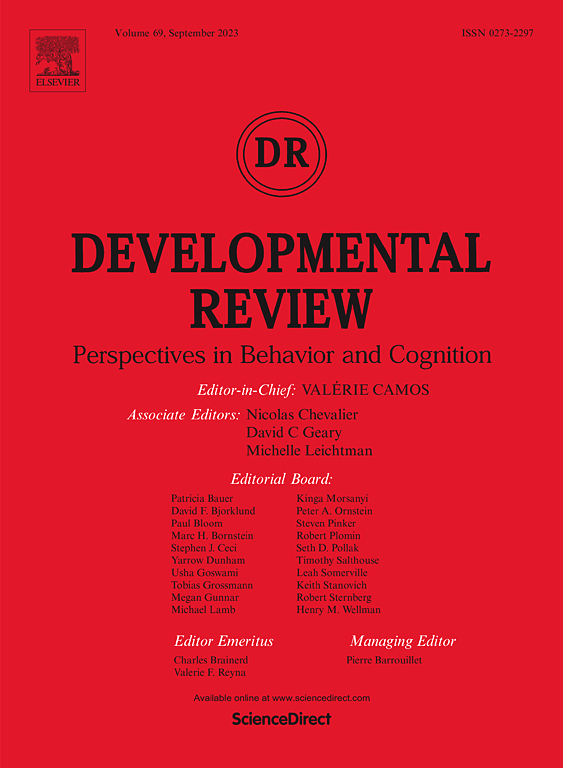The Elusive “Developmental Mechanism”: What they are and how to study and test them
IF 5.6
1区 心理学
Q1 PSYCHOLOGY, DEVELOPMENTAL
引用次数: 2
Abstract
Few issues have garnered as much attention as that of understanding mechanisms of developmental change. Understanding mechanisms of developmental change is important because it allows researchers to go beyond studying at what age an ability emerges to understanding the processes by which those abilities develop in the first place. Despite the clear importance of mechanisms, the notion of a developmental mechanism or mechanism of developmental change remains largely undefined and there exists no clear guidance on how to study these mechanisms systematically in the developmental literature. Given these outstanding questions, this paper has two main aims. The first aim was to provide a clear definition of mechanisms of developmental change that aligns most closely with how most, if not all, developmental psychologists think about developmental mechanisms. The second goal was to provide concrete suggestions for how developmental scientists might study and test different kinds of mechanisms of developmental change based on their perceived manipulability. One of the main arguments of the paper is that there is no one-size-fits-all approach to studying and testing mechanisms of developmental change and that how developmental researchers study them depends crucially on their perceived manipulability.难以捉摸的“发展机制”:它们是什么以及如何研究和测试它们
很少有问题像理解发展变化的机制那样引起如此多的注意。理解发育变化的机制是很重要的,因为它使研究人员能够超越研究一种能力在什么年龄出现的范围,去理解这些能力最初发展的过程。尽管机制具有明确的重要性,但发育机制或发育变化机制的概念在很大程度上仍未定义,并且在发育文献中没有关于如何系统研究这些机制的明确指导。鉴于这些悬而未决的问题,本文有两个主要目的。第一个目标是为发展变化的机制提供一个清晰的定义,这个定义与大多数(如果不是全部的话)发展心理学家对发展机制的看法最为一致。第二个目标是为发展科学家如何研究和测试基于可操纵性的不同类型的发展变化机制提供具体建议。这篇论文的一个主要论点是,没有一种放之四海而皆准的方法来研究和测试发展变化的机制,发展研究人员如何研究它们在很大程度上取决于它们的可操纵性。
本文章由计算机程序翻译,如有差异,请以英文原文为准。
求助全文
约1分钟内获得全文
求助全文
来源期刊

Developmental Review
PSYCHOLOGY, DEVELOPMENTAL-
CiteScore
11.00
自引率
3.00%
发文量
27
审稿时长
51 days
期刊介绍:
Presenting research that bears on important conceptual issues in developmental psychology, Developmental Review: Perspectives in Behavior and Cognition provides child and developmental, child clinical, and educational psychologists with authoritative articles that reflect current thinking and cover significant scientific developments. The journal emphasizes human developmental processes and gives particular attention to issues relevant to child developmental psychology. The research concerns issues with important implications for the fields of pediatrics, psychiatry, and education, and increases the understanding of socialization processes.
 求助内容:
求助内容: 应助结果提醒方式:
应助结果提醒方式:


